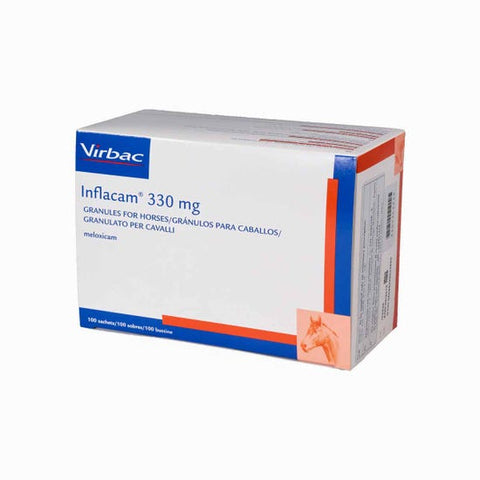
Excellent Customer Service

Best Prices Around


Accredited by UK Vets Association

Delivered Direct To Your Door
Inflacam Granules for Horses
Inflacam helps to reduce inflammation and relieve pains in acute and choric musclo-skeletal disorders in horses.
It is available in 330mg x 100 sachets.
Administration:
Add 1 sachet daily to your horses feed for up to 14 days.
Inflacam 330 mg, granules for horses
2. QUALITATIVE AND QUANTITATIVE COMPOSITION
One sachet contains:
Active substance:
Meloxicam 330 mg.
For the full list of excipients, see section 6.1.
3. PHARMACEUTICAL FORM
Granules in sachet.
Pale yellow granules.
4. CLINICAL PARTICULARS
4.1 Target species
Horses.
4.2 Indications for use, specifying the target species
Alleviation of inflammation and relief of pain in both acute and chronic musculo-skeletal disorders in horses weighing between 500 and 600 kg.
4.3 Contraindications
Do not use in pregnant or lactating mares.
Do not use in horses suffering from gastrointestinal disorders such as irritation and haemorrhage,
impaired hepatic, cardiac or renal function and haemorrhagic disorders.
Do not use in case of hypersensitivity to the active substance or to any of the excipients.
Do not use in horses less than 6 weeks of age.
4.4 Special warnings for each target species.
None.
4.5 Special precautions for use
Special precautions for use in animals
Avoid use in any dehydrated, hypovolaemic or hypotensive animal, as there is a potential risk of renal toxicity.
In order to minimise risk of intolerance, the product should be mixed into muesli feed.
This product is only for use in horses weighing between 500 and 600 kg.
Special precautions to be taken by the person administering the veterinary medicinal product to animals
People with known hypersensitivity to non-steroidal anti-inflammatory drugs (NSAIDs) should avoid contact with the veterinary medicinal product.
In case of accidental ingestion, seek medical advice immediately and show the package leaflet or the label to the physician.
4.6 Adverse reactions (frequency and seriousness)
Isolated cases of adverse reactions typically associated with NSAIDs were observed in clinical trials (slight urticaria, diarrhoea). Symptoms were reversible. In very rare cases loss of appetite, lethargy, abdominal pain and colitis have been reported. In very rare cases anaphylactoid reactions, which may be serious (including fatal), may occur and should be treated symptomatically.
The frequency of adverse reactions is defined using the following convention:
- very common (more than 1 in 10 animals displaying adverse reactions during the course of one treatment)
- common (more than 1 but less than 10 animals in 100 animals)
- uncommon (more than 1 but less than 10 animals in 1,000 animals)
- rare (more than 1 but less than 10 animals in 10,000 animals)
- very rare (less than 1 animal in 10,000 animals, including isolated reports).
4.7 Use during pregnancy, lactation or lay
Laboratory studies in cattle have not provided any evidence for teratogenic, foetotoxic, or maternotoxic effects. However, no data have been generated in horses. Therefore the use in horses is not recommended during pregnancy and lactation.
4.8 Interaction with other medicinal products and other forms of interaction
Do not administer concurrently with glucocorticoids, other NSAIDs or with anti-coagulant agents.
4.9 Amounts to be administered and administration route
In-feed use.
To be administered mixed with food at a dose of 0.6 mg/kg body weight, once daily, up to 14 days.
The product should be added to 250 g of muesli feed, prior to feeding.
Each sachet contains one dose for a horse weighing between 500 and 600 kg and the dose must not be divided into smaller doses.
Avoid introduction of contamination during use.
4.10 Overdose (symptoms, emergency procedures, antidotes), if necessary
In the case of overdose symptomatic treatment should be initiated.
4.11 Withdrawal period
Meat and offal: 3 days.
Not authorised for use in lactating animals producing milk for human consumption.
5. PHARMACOLOGICAL PROPERTIES
Pharmacotherapeutic group: Anti-inflammatory and anti-rheumatic products, non-steroids (oxicams).
ATCvet code: QM01AC06.
5.1 Pharmacodynamic properties
Meloxicam is a non-steroidal anti-inflammatory drug (NSAID) of the oxicam class which acts by inhibition of prostaglandin synthesis, thereby exerting anti-inflammatory, analgesic, anti-exudative and antipyretic effects. It reduces leukocyte infiltration into the inflamed tissue. To a minor extent it also inhibits collagen-induced thrombocyte aggregation. Meloxicam also has anti-endotoxic properties because it has been shown to inhibit production of thromboxane B2 induced by intravenous E. coli endotoxin administration in calves and pigs.
5.2 Pharmacokinetic particulars
Absorption
When the product is used according to the recommended dosage regime, the oral bioavailability is approximately 98%. Maximal plasma concentrations are obtained after approximately 2–3 hours. The accumulation factor of 1.08 suggests that meloxicam does not accumulate when administered daily.
Distribution
Approximately 98% of meloxicam is bound to plasma proteins. The volume of distribution is 0.12 l/kg.
Metabolism
The metabolism is qualitatively similar in rats, humans, cattle and pigs (including mini-pigs), although quantitatively there are differences. The major metabolites found in all species were the 5-hydroxyand 5-carboxy- metabolites and the oxalyl- metabolite. The metabolism in horses was not investigated. All major metabolites have been shown to be pharmacologically inactive.
Elimination
Meloxicam is eliminated with a terminal half-life of 7.7 hours.
6. PHARMACEUTICAL PARTICULARS
6.1 List of excipients
Glucose monohydrate
Povidone
Apple flavour (containing butylated hydroxyanisole (E320))
Crospovidone
6.2 Incompatibilities
In the absence of compatibility studies, this veterinary medicinal product must not be mixed with other veterinary medicinal products.
6.3 Shelf life
Shelf life of the veterinary medicinal product as packaged for sale: 3 years.
Shelf life after incorporation into muesli feed: use immediately.
6.4 Special precautions for storage
This veterinary medicinal product does not require any special storage conditions.
6.5 Nature and composition of immediate packaging
Paper foil sachets (paper/PE/alu/PE) containing 1.5 g granules per sachet in a cardboard box with 100 sachets.
Not all pack sizes may be marketed.
6.6 Special precautions for the disposal of unused veterinary medicinal product or waste materials derived from the use of such products
Any unused veterinary medicinal product or waste materials derived from such veterinary medicinal products should be disposed of in accordance with local requirements.
Legal Category: POM-V
To find details on all veterinary medicinal products currently authorised in the UK, please see the VMD's Product Information Database.
IMPORTANT LEGAL INFORMATION: this is a Veterinary Prescription Only Medicine (POM-V), which can only be prescribed by a veterinary surgeon, but may be dispensed by another veterinary surgeon or pharmacist.
DESCRIPTION
Inflacam Granules for Horses
Inflacam helps to reduce inflammation and relieve pains in acute and choric musclo-skeletal disorders in horses.
It is available in 330mg x 100 sachets.
Administration:
Add 1 sachet daily to your horses feed for up to 14 days.
Inflacam 330 mg, granules for horses
2. QUALITATIVE AND QUANTITATIVE COMPOSITION
One sachet contains:
Active substance:
Meloxicam 330 mg.
For the full list of excipients, see section 6.1.
3. PHARMACEUTICAL FORM
Granules in sachet.
Pale yellow granules.
4. CLINICAL PARTICULARS
4.1 Target species
Horses.
4.2 Indications for use, specifying the target species
Alleviation of inflammation and relief of pain in both acute and chronic musculo-skeletal disorders in horses weighing between 500 and 600 kg.
4.3 Contraindications
Do not use in pregnant or lactating mares.
Do not use in horses suffering from gastrointestinal disorders such as irritation and haemorrhage,
impaired hepatic, cardiac or renal function and haemorrhagic disorders.
Do not use in case of hypersensitivity to the active substance or to any of the excipients.
Do not use in horses less than 6 weeks of age.
4.4 Special warnings for each target species.
None.
4.5 Special precautions for use
Special precautions for use in animals
Avoid use in any dehydrated, hypovolaemic or hypotensive animal, as there is a potential risk of renal toxicity.
In order to minimise risk of intolerance, the product should be mixed into muesli feed.
This product is only for use in horses weighing between 500 and 600 kg.
Special precautions to be taken by the person administering the veterinary medicinal product to animals
People with known hypersensitivity to non-steroidal anti-inflammatory drugs (NSAIDs) should avoid contact with the veterinary medicinal product.
In case of accidental ingestion, seek medical advice immediately and show the package leaflet or the label to the physician.
4.6 Adverse reactions (frequency and seriousness)
Isolated cases of adverse reactions typically associated with NSAIDs were observed in clinical trials (slight urticaria, diarrhoea). Symptoms were reversible. In very rare cases loss of appetite, lethargy, abdominal pain and colitis have been reported. In very rare cases anaphylactoid reactions, which may be serious (including fatal), may occur and should be treated symptomatically.
The frequency of adverse reactions is defined using the following convention:
- very common (more than 1 in 10 animals displaying adverse reactions during the course of one treatment)
- common (more than 1 but less than 10 animals in 100 animals)
- uncommon (more than 1 but less than 10 animals in 1,000 animals)
- rare (more than 1 but less than 10 animals in 10,000 animals)
- very rare (less than 1 animal in 10,000 animals, including isolated reports).
4.7 Use during pregnancy, lactation or lay
Laboratory studies in cattle have not provided any evidence for teratogenic, foetotoxic, or maternotoxic effects. However, no data have been generated in horses. Therefore the use in horses is not recommended during pregnancy and lactation.
4.8 Interaction with other medicinal products and other forms of interaction
Do not administer concurrently with glucocorticoids, other NSAIDs or with anti-coagulant agents.
4.9 Amounts to be administered and administration route
In-feed use.
To be administered mixed with food at a dose of 0.6 mg/kg body weight, once daily, up to 14 days.
The product should be added to 250 g of muesli feed, prior to feeding.
Each sachet contains one dose for a horse weighing between 500 and 600 kg and the dose must not be divided into smaller doses.
Avoid introduction of contamination during use.
4.10 Overdose (symptoms, emergency procedures, antidotes), if necessary
In the case of overdose symptomatic treatment should be initiated.
4.11 Withdrawal period
Meat and offal: 3 days.
Not authorised for use in lactating animals producing milk for human consumption.
5. PHARMACOLOGICAL PROPERTIES
Pharmacotherapeutic group: Anti-inflammatory and anti-rheumatic products, non-steroids (oxicams).
ATCvet code: QM01AC06.
5.1 Pharmacodynamic properties
Meloxicam is a non-steroidal anti-inflammatory drug (NSAID) of the oxicam class which acts by inhibition of prostaglandin synthesis, thereby exerting anti-inflammatory, analgesic, anti-exudative and antipyretic effects. It reduces leukocyte infiltration into the inflamed tissue. To a minor extent it also inhibits collagen-induced thrombocyte aggregation. Meloxicam also has anti-endotoxic properties because it has been shown to inhibit production of thromboxane B2 induced by intravenous E. coli endotoxin administration in calves and pigs.
5.2 Pharmacokinetic particulars
Absorption
When the product is used according to the recommended dosage regime, the oral bioavailability is approximately 98%. Maximal plasma concentrations are obtained after approximately 2–3 hours. The accumulation factor of 1.08 suggests that meloxicam does not accumulate when administered daily.
Distribution
Approximately 98% of meloxicam is bound to plasma proteins. The volume of distribution is 0.12 l/kg.
Metabolism
The metabolism is qualitatively similar in rats, humans, cattle and pigs (including mini-pigs), although quantitatively there are differences. The major metabolites found in all species were the 5-hydroxyand 5-carboxy- metabolites and the oxalyl- metabolite. The metabolism in horses was not investigated. All major metabolites have been shown to be pharmacologically inactive.
Elimination
Meloxicam is eliminated with a terminal half-life of 7.7 hours.
6. PHARMACEUTICAL PARTICULARS
6.1 List of excipients
Glucose monohydrate
Povidone
Apple flavour (containing butylated hydroxyanisole (E320))
Crospovidone
6.2 Incompatibilities
In the absence of compatibility studies, this veterinary medicinal product must not be mixed with other veterinary medicinal products.
6.3 Shelf life
Shelf life of the veterinary medicinal product as packaged for sale: 3 years.
Shelf life after incorporation into muesli feed: use immediately.
6.4 Special precautions for storage
This veterinary medicinal product does not require any special storage conditions.
6.5 Nature and composition of immediate packaging
Paper foil sachets (paper/PE/alu/PE) containing 1.5 g granules per sachet in a cardboard box with 100 sachets.
Not all pack sizes may be marketed.
6.6 Special precautions for the disposal of unused veterinary medicinal product or waste materials derived from the use of such products
Any unused veterinary medicinal product or waste materials derived from such veterinary medicinal products should be disposed of in accordance with local requirements.
Legal Category: POM-V
To find details on all veterinary medicinal products currently authorised in the UK, please see the VMD's Product Information Database.
IMPORTANT LEGAL INFORMATION: this is a Veterinary Prescription Only Medicine (POM-V), which can only be prescribed by a veterinary surgeon, but may be dispensed by another veterinary surgeon or pharmacist.





